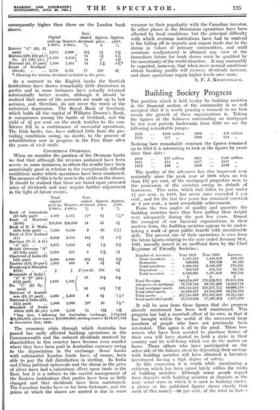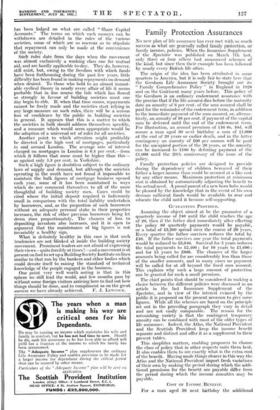Building Society Progress
THE position which is held to-day by building societies in the financial section of. the community is so well accepted that it is worth pausing a moment to see how recent the growth of these organizations is. Taking the figures of the balances outstanding on mortgages by .ten year periods backwards from 1929 we see the following remarkable jumps :
1929 £268 million 1909 £58 million 1919 .. £57 „ 1899 £44 „
Noticing how remarkably constant the figures remained up to 1919 it is interesting to look at the figures by years since that date :
1919 .. £57 million 1925 £148 million 1921 • • £75 „ 1927
£197 ffo
1923 .. £98 ,, 1929
£268 Pr The quality of the advances has also improved very materially since the peak year of 1896 when no less than 13i per cent. of the mortgaged properties were in the possession of the societies owing to default of borrowers. This ratio, which had fallen to just under 11; per cent. in 1919, has never since exceeded 1 r er cent., and for the last five years has remained constant at -1 per cent., a most remarkable achievement. From the two angles of quality and quantity the building societies have thus been pulling their weight very adequately during the past few years. Almost the youngest of our financial organizations in their modern form, the building societies appear to be under- taking a work of great public benefit with considerable skill. The present size of their operations is seen from the latest figures relating to the year ended January 81st, 1931, recently issued in an unofficial form by the Chief Registrar of Friendly Societies :
Number of Accounts : Year 1929 Year 1930 Increase Share investors .. 1,265,329 1,448,928 183,599 Borrowers 628,933 720,309 91,436 Total members .. 1,894,262 2,169,297 275,035 Depositors .. 393,829 428,562 34,733 Total accounts 2,288,091 2,597,859 309,768 £ £ £ Total Receipts 140,574,007 170,529,211 29,955,204 Advances on mortgage 74,718,748 88,782,466 14,063,718 Total mortgage assets 268,141,456 316,237,732 48,096,276 Total other assets .. 44,604.427 54,819,696 10,215,269 Total assets .. 312,745,883 371,057,428 58,311,545 Total undivided profit ' 15,710,024 • 17,587,403 1,877,379
It will be seen from these figures that the progress already mentioned has been well maintained. This progress has had a snowball effect of its own, in that it has brought within the ambit of the movement large numbers of people who have not previously been interested. This again is all to the good. Those bor- rowers who have been assisted to purchase homes of their own will have started to hold a stake in their country and its well-being which can do the nation no harm. Those others who have participated on the other side of the balance sheet by depositing their savings with building societies will have obtained a lucrative investment having a high degree of safety. In this connexion it is worth while mentioning a criticism which has been raised lately within the ranks of building societies. Although many people regard their deposits with building societies as deposits in the more usual sense in which it is used in banking circles, a glance at the published figures shows clearly that most of this money-80 per cent. of the total in fact-- has been lodged on what are called " Share Capital Accounts." The terms on which such moneys can be withdrawn are detailed in the rules - of the various societies, some of which are so onerous as to stipulate that repayment can only be made at the convenience of the society.
SOch rules date from the days when the movement was almost exclusively a working class one for mutual aid, and are hardly applicable to-day. They do, however, still exist, but, owing to the freedom with which funds have been forthcoming during the past few years, little difficulty has been found in making repayments on demand when desired. To those who hold to an almost immut- able cyclical theory in nearly every affair of life it seems probable that in due course the tide which has flowed so strongly in favour of building societies must one day begin to ebb. If, when that time comes, repayments cannot be freely made and the societies start relying in any large measure on such rules, there will be a serious loss of confidence by the public in building societies in general. It appears that this is a matter to which the societies in bulk should address themselves speedily, and a measure which would seem appropriate would be the adoption of a universal set of rules for all societies.
Another point to which attention might profitably be directed is the high cost of mortgages, particularly in and around London. The average rate of interest charged on mortgages in London is 6.4 per cent.—from which it follows that some must be higher, than this— as against only 5.3 per cent. in Yorkshire.
Such a high figure is doubtless subject to the ordinary laws of supply and demand, but although the societies operating in the south have not found it impossible to maintain the bulk figures of mortgage business opened each year, some of it has been maintained in ways which do not commend themselves to all of the more thoughtful of building society men. Cases could be cited where the initial deposit required is ludicrously small in comparison with the total liability undertaken by borrowers, and, as the proportion of such borrowers without an adequate personal stake in their properties increases, the risk of other previous borrowers being let down rises proportionately. The chances of loss to depositing investors also increases, and it is open to argument that the maintenance of big figures is not invariably a healthy sign. What is definitely healthy in this case is that such tendencies are not blinked at inside the building society movement. Prominent leaders are not afraid of expressing their views—quite forcibly at times !—and a movement is at present on foot to set up a Building Society Institute on lines similar to that run by the bankers and other bodies which could devote itself to raising the standard of technical knowledge of the people engaged in the business. One point very well worth noting is that in this sphere we still lead the world, and few months pass by without some foreign visitors arriving here to find out how things should be done, and to compliment us on the great success we have already achieved. F. J. LEWCOCK.











































 Previous page
Previous page